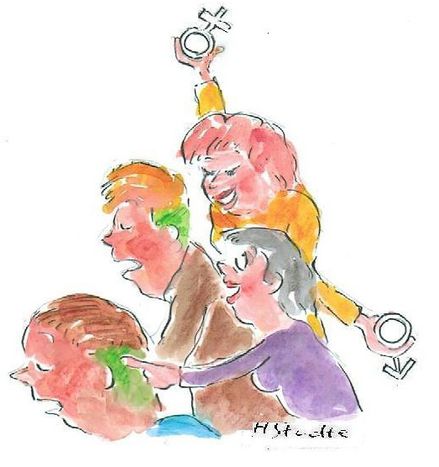
Pisa study 2009: Europe's boys 'wet behind ears'
Published on
Translation by:
NickWet-behind-the-ears, ‘greenhorn’ or half-baked; the results of the triannual global league table in 2009 tell us nothing about adolescent boys that we did not know before
Hurray! It was that time of year again. In mid-December 2010 the Paris-based OECD (Organisation for Economic Cooperation and Development) published the Pisa (programme for international student assessment) study for 2009. This tested the education systems in 64 countries to once more show kids and parents in Central Europe that they are only average by world standards. Topping the results in the three main tested categories of maths, science and literacy among 15-year-olds are students from China, Singapore, South Korea, Hong Kong and the wider Asian region. There were painful results from Austria, Luxembourg and Spain, where schoolchildren scraped bottom of the pile in European tables for reading. Only the Finns (who came third) and the Estonians (number five in Europe) can compete in the top ten. So, on the whole, nothing has changed…
Otherwise the PISA study confirms the necessity not only for teacher-training, but also for an improved integration of children from abroad and a better social environment, something we have certainly already known for a long time about girls. Boys, especially at the tender age of fifteen, easily fall behind. Ten years after the first study the trend has actually increased: 15-year-olds in the UK, which came 25th in the study, are and remain wet behind the ears at this critical age, or as they say in Germany (which made 20th position in the Pisa study), green behind the ears (gruen hinter den Ohren). The English expression refers to the spot which is last to be dried up after a baby animal's birth, whilst the German version stretches to the colour of immaturity: even US president Barack Obama used it at one point of his 2008 presidential campaign!
Without exception, girls in every member country of the OECD are 39 points ahead of their male counterparts in their understanding of writing and speaking. French boys at this age are not green behind the ears but quite simply bleu, like the ‘blue’ raw beef steak popular in France, which came 22nd in the list. 26% of French 15-year-old boys have writing difficulties, compared to only 14% of girls.
In school terms it is said that Europe's Mediterraneans have still not crawled out of their shell: Non è ancora uscito dall ‘uevo in Italian (29th in the study) and Aún no ha salido del cascarón ('he hasn't yet come out of the hatch') in Spanish - Spain came 33rd in the study. In the meantime their Polish counterparts, 15th in the list, have traces of milk under their noses (mieć mleko pod nosem), where British students are only half-baked.
Is the way in which European schools support young people ultimately guilty of making the little darlings more naïve than their older pupils and more likely to shirk responsibility? Are over-ambitious and gender-specific expectations being placed on boys? A German study in 2009 found that a key cause is the fact that the education system remains in female hands. So, at the end of the day, it’s the girls’ fault again…
Translated from PISA-Studie: Jungs ‘grün hinter den Ohren’



